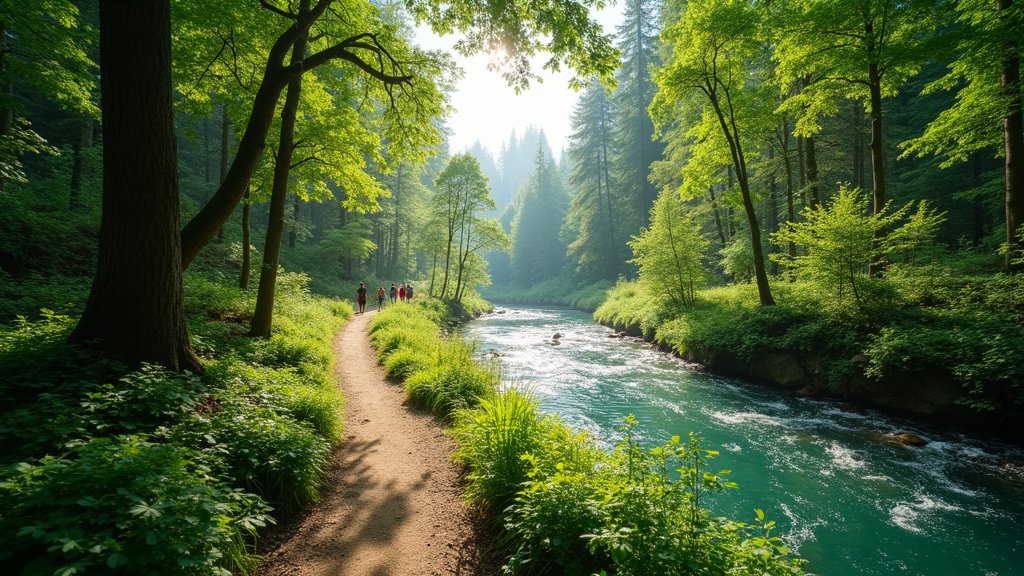Metro Invests in Parks and Natural Areas
Metro has announced the allocation of $6.25 million in grants dedicated to parks and nature projects throughout the Portland metropolitan region. This substantial investment underscores Metro’s commitment to connecting people with the natural world and enhancing accessibility to these vital spaces. The funds represent a significant portion of the voter-approved 2019 parks and nature bond measure, highlighting the community’s dedication to environmental stewardship and the preservation of natural areas.
The grants are designed to support a diverse range of projects aimed at improving the quality and accessibility of natural areas. These projects include trail development, habitat restoration, and the creation of new recreational opportunities for residents. The initiative aims to foster a deeper appreciation for nature and promote the health and well-being of the community by providing greater access to green spaces. The selection process for grant recipients prioritized projects that demonstrate a clear commitment to environmental conservation, community engagement, and equitable access.
Protecting and Restoring Natural Habitats
Metro’s efforts extend beyond financial grants; the organization is actively involved in land acquisition and habitat restoration. As part of this commitment, Metro has made a historic purchase in Clackamas County, acquiring 553 acres of land. This acquisition represents a significant step towards preserving and enhancing the natural environment within the region. The acquired land is slated for extensive restoration efforts, with a primary focus on improving habitat for fish and wildlife, as well as enhancing water quality. These efforts are vital for the health of the local ecosystem and the overall biodiversity of the region.
The restoration plan for the Clackamas County land will likely involve a multi-faceted approach. This may include the removal of invasive species, the re-establishment of native plant communities, and the implementation of best management practices to improve water quality. The restoration process is expected to be a long-term undertaking, requiring careful planning, ongoing monitoring, and collaboration with various stakeholders, including environmental organizations, local communities, and government agencies.
Enhancing Community Access to Nature
The grants program and land acquisition initiatives are integral components of Metro’s broader strategy to protect and restore natural areas in the Portland metropolitan region. The organization recognizes the crucial role that natural areas play in providing essential ecosystem services, such as clean air and water, while also offering recreational opportunities for residents. By investing in these projects, Metro aims to create a more resilient and sustainable region for future generations.
Metro’s commitment to enhancing community access to nature also involves the development of educational programs and outreach initiatives. These programs are designed to educate the public about the importance of conservation and to encourage responsible stewardship of natural resources. By fostering a greater understanding of the environment, Metro hopes to inspire individuals to take an active role in protecting and preserving the region’s natural heritage.
The projects funded by the grants will vary in scope and focus, reflecting the diverse needs and priorities of the communities they serve. Some projects may concentrate on improving existing parks and trails, while others may focus on creating new green spaces in underserved areas. The common thread among all the funded projects is a commitment to enhancing the quality of life for residents and promoting a deeper connection with the natural world.
The 2019 Parks and Nature Bond Measure
The 2019 parks and nature bond measure served as the financial cornerstone for Metro’s recent environmental initiatives. The measure was approved by voters, indicating a strong community endorsement for conservation and environmental protection. The bond measure provided the necessary funding to undertake significant projects, including land acquisitions, habitat restoration efforts, and grant programs for local communities.
The successful passage of the bond measure demonstrated a collective commitment to investing in the future of the region. The funds are being strategically deployed to achieve a range of environmental goals, including protecting wildlife habitats, improving water quality, and expanding access to parks and natural areas. The projects supported by the bond measure will have a lasting positive impact on the environment and the quality of life for residents.
A Long-Term Commitment to the Environment
Metro’s recent actions reflect a long-term commitment to environmental stewardship and the protection of natural resources. The organization’s ongoing efforts in land acquisition, habitat restoration, and grant programs are essential for preserving the region’s natural heritage. The investments in parks and natural areas demonstrate a vision for a more sustainable and resilient future.
The impact of Metro’s initiatives will be felt throughout the Portland metropolitan region. The projects supported by the grants will enhance the quality of life for residents, provide increased access to recreational opportunities, and protect valuable natural resources. The historic land purchase in Clackamas County will play a crucial role in restoring the natural environment, improving habitat for fish and wildlife, and enhancing water quality.
Metro’s ongoing work serves as a model for other regional organizations, illustrating the importance of investing in parks and natural areas for the benefit of both the environment and the community. The allocation of the $6.25 million in grants signifies a strong commitment to these goals. It reinforces the importance of connecting people with nature and making natural areas accessible for all residents. The acquisition of 553 acres in Clackamas County further demonstrates Metro’s dedication to preserving and restoring the natural environment for generations to come.




